For human health, the balance of micro and macro elements in the body is important. In the pharmacy, you can see many preparations that contain potassium in their composition - these are multivitamin complexes, and preparations containing a combination of potassium with magnesium, and preparations that include exclusively potassium. But what the body needs potassium for and what its daily intake is, not many people know.
What does the body need potassium for?
Potassium is considered a "heart" element that contributes to the normal functioning of the heart, it:
- normalizes heart rate;
- strengthens the heart muscle;
- participates in the prevention of atherosclerosis;
- normalizes blood pressure;
- improves the functioning of the vascular system.
If we consider the effect of potassium in general, then when taking it:
- the condition of the liver and kidneys improves;
- puffiness is prevented;
- problems with urination are eliminated;
- depressive conditions disappear;
- brain cells are better supplied with oxygen;
- toxins leave the body and allergic reactions disappear.
Symptoms and causes of potassium deficiency
There are a number of symptoms that can identify a lack of potassium:
- interruptions in the work of the heart;
- drowsiness;
- paralysis;
- muscle pain;
- labored breathing;
- constipation;
- nausea;
- hypotension;
- allergy;
- a state of apathy;
- small volume of urine;
- swelling of the limbs.
The main causes of potassium deficiency are:
- lack of balance in nutrition;
- long-term bowel disorder;
- incessant vomiting;
- unexplained sweating;
- disruption of the adrenal glands;
- the use of hormonal drugs (triamcinolone, betamethasone, methylprednisalone);
- taking diuretics, laxatives;
- stress;
- burns;
- anorexia, bulimia;
- diabetes;
- genetic changes (Cushing's, Liddle's syndrome);
- fast.
Symptoms and causes of excess potassium
Lack of potassium is not the only problem that may be, there may be too much potassium in the body. This condition is called hyperkalemia.
It is important to remember that only a biochemical blood test will help to identify this disease in the human body.
The symptoms of this disease are:
- decrease in cell excitability (depolarization);
- abnormal heartbeats;
- heart failure;
- dyspnea;
- restless state;
- glucose intolerance;
- kidney disease;
- improper blood pressure in the kidneys;
- intestinal paresis (impaired motor activity and tone of the intestinal wall);
- fast fatiguability;
- peptic ulcer (gastritis).
A large number of diseases and not only refer to the reasons for the increase in potassium in the blood:
- all types of necrosis (toxic, traumatic, trophoneurotic);
- tumors;
- metabolic acidosis;
- hyperglycemia (lack of insulin);
- increased permeability of the outer cell membranes (anaphylactic shock);
- hormonal disorders;
- excretion of the excretory system;
- excessive use of drugs containing potassium;
- polyuria;
- glycosidic intoxication;
- blood transfusion;
- lupus nephritis;
- severe genetic diseases (hyperkalemic paralysis).
What is the norm of potassium in the blood of a woman, man, child
The rate of potassium in a person's blood depends on many factors:
- age;
- floor;
- weight;
- place of residence.
Based on this, there are average values for potassium levels:
- in children under 1 year of age, 4.0-5.4 mmol / l;
- the potassium content in a child from 1 to 15 years old is 3.3-4.8 mmol / l;
- 15-18 years old - 3.3-4.8 mmol / l;
- for men and women 3.4-5.6 mmol / l.
Scientists know that during pregnancy, the potassium indicator in women changes with respect to the term, and after childbirth it sharply decreases due to the large loss of blood. Also, women after 50 years old need to monitor the level of potassium, which decreases sharply. For men, the critical age is 60 years and older.
Potassium during sports activities
Potassium (what the body needs this trace element for every person should know) is important to take for people leading an active lifestyle. Foods high in this element are the main source of energy. During intense physical activity, the cardiovascular system is under increased stress, and potassium is excreted in sweat.
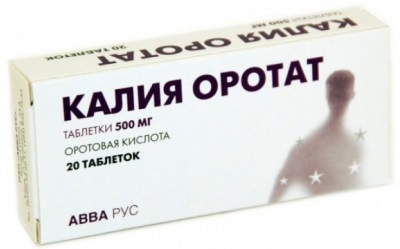
But a deficiency of potassium in the body is unacceptable, since it is this element that prevents the occurrence of heart disease (stroke, heart attack), muscle cramps, and helps to restore strength after exercise. It is very useful to consume sports drinks enriched with this component.
The relationship of potassium and sodium
Why the body needs potassium, analysis of the relationship of this element with sodium will help to understand. Potassium and sodium are linked together in biochemical processes. They have the opposite effect on water metabolism: potassium has a diuretic effect, sodium retains water.
If the diet is dominated by foods with a high potassium content, then sodium becomes more. And if you consume more sodium, then potassium is removed, metabolic products remain. In a healthy body, trace elements balance each other, but in the life of a modern person, everything is different.
The consumption of foods containing potassium has decreased significantly. An increased background of sodium is observed, this leads to problems of the cardiovascular system, the brain, and the general condition worsens.
Unlike sodium, potassium is excreted in the urine, this is due to evolution. Nature has the ability to retain sodium in the body, but waste potassium. Therefore, sodium deficiency is easier to cope with than excess sodium. The balance of potassium and sodium is achieved with proper nutrition.
How much potassium to consume daily
The approximate dose of potassium for an adult is 1.2-2.5 g. During pregnancy, the potassium rate increases and can reach 2-3.5 g. The norm for children is 16-30 mg per 1 kg of muscle mass.
To prevent health problems, stick to a 1: 2 potassium to sodium ratio. Do not exceed the generally accepted norms of elements for diseases, you should consult a doctor for advice.
What foods contain the most potassium
The favorites for potassium content are honey and apple cider vinegar.
The following places were distributed as follows:
- raisins;
- berries;
- greens;
- wheat bran;
- dried apricots;
- prunes;
- almond;
- peanut;
- hazelnut;
- walnuts and pine nuts;
- potatoes;
- Brussels sprouts;
- tomatoes;
- cucumbers;
- carrot;
- beet;
- onion;
- garlic;
- Red pepper;
- beans;
- chanterelles;
- White mushrooms;
- bananas;
- apples;
- peaches;
- apricots;
- watermelons;
- grapes;
- persimmon;
- oranges;
- grapefruit;
- tangerines;
- mutton;
- beef.
Potassium foods - table

 Don't miss the most popular column article: Fashionable haircut for medium hair. Photo, front and back views.
Don't miss the most popular column article: Fashionable haircut for medium hair. Photo, front and back views.Tips for Proper Food Preparation and Nutrition
How much useful substances are preserved in food depends on the cooking temperature, oxygen supply, and the acidity of the dish. With prolonged exposure to high temperatures, vitamins are destroyed. In particular, this applies to potassium.
The lower the cooking temperature, the better. It is best to eat raw foods if possible.
In general, it follows:
- cook food at temperatures below 100 ° C;
- use a slow cooker;
- try not to use a microwave oven (the structure of food changes);
- give up fried foods;
- do not consume large amounts of vegetable oil.
Potassium mixture - recipe
How potassium acts on the body, what is it for, what products it contains, how to prepare a medicinal mixture - all this you need to know in order to get rid of various diseases associated with a lack of potassium in the body. An example of such a vitamin cocktail is a potassium mixture of dried fruits used for the treatment and prevention of heart disease.
The mixture includes:
- honey;
- walnuts;
- dried apricots;
- raisins;
- prunes;
- lemon.
Dried fruits and nuts contain a lot of potassium, therefore, heart function improves, arrhythmia disappears. They are effective in the fight against atherosclerosis, hypertension. Prunes have a tonic effect and are a prophylactic agent against oncology. Dried apricots are good for vision, improve the condition of blood vessels. Honey is a universal remedy for all diseases.
For cooking, you need to take the ingredients in the following proportions:
- 200 g of prunes;
- 200 g of raisins;
- 200 g dried apricots;
- 200 g of nuts;
- lemon;
- honey.
All components are thoroughly washed and steamed, then scrolled in a meat grinder, add 300 g of honey. Cap the mixture tightly and store in the refrigerator. It should be taken in 1 tbsp. three times a day after meals, one meal a day is enough for children.
Vitamins containing potassium
To replenish the body with potassium, they take vitamin complexes, for which the body needs them, what benefits they bring, is indicated in the list:
- Doppelgerts Active helps the body to replenish deficient substances, restores efficiency, improves mood, general well-being. The potassium content in a daily dose is 600 mg. It is used as an additional source of biologically essential substances.
- Vitrum Century - a combined preparation containing all the necessary substances for people aged 50 years. Each potassium dose contains 80 mg.
- Teravit Antistress - complex multivitamin preparation, consisting of trace elements and extracts of medicinal plants. A budget preparation with the required potassium content of 80 mg.
- Asparkam is an irreplaceable source of potassium (175 mg) and magnesium, improves metabolic processes, restores the electrolyte process.
- Panangin regulates metabolic reactions, has an antiarrhythmic effect, participates in synoptic transmission. Potassium contains 45.2 mg.
- Vitrum and vitrum plus. It is used in the recovery period after viral and infectious diseases, during the period of increased mental and physical exertion, sports training, and insufficiently balanced nutrition. The potassium content in one tablet is 40 mg.
- Potassium chloride. Available in ampoules. 1 ml of solution contains 40 mg of potassium. It is indicated for use in hypokalemia caused by conditions that promote the excretion of potassium from the body, as well as in arrhythmias,
- Qudesan with potassium and magnesium. The drug is a line of products under the general name "Kudesan". One tablet of the drug contains 97 mg of potassium. The tool has been successfully used to treat high blood pressure and diseases of the cardiovascular system.
- A preparation that also contains a combination of potassium and magnesium. Designed to normalize the balance of electrolytes in the human body.In addition, it normalizes heart rate, lowers blood pressure, maintains water-salt metabolism and prevents cholesterol deposition. One tablet contains 100 mg of potassium.
- Basiko concentrate from Nahrin. The drug belongs to the category of dietary supplements. Designed to replenish the balance of trace elements. It is indicated for cardiovascular diseases, bone fractures, allergies, osteoporosis, kidney diseases, gastrointestinal ulcers, skin diseases, urolithiasis, etc.
- Potassium orotate. One tablet contains 500 mg of potassium orotate. It is used for muscular lystrophy, heart diseases, including insufficiency, heart attack, diseases of the liver and urinary system, dermatological diseases.
- Centrum. Complex preparation containing vitamins and minerals. Contains 40 mg of potassium. It is used for the prevention of hypovitaminosis, after antibiotic therapy, long-term infectious diseases, and malnutrition.
- Vitalux Plus... Refers to dietary supplements. It is taken for eye diseases, such as retinal dystrophy. But it can also be used as an additional source of vitamins. Contains most of the essential vitamins and minerals.
- Pamaton. A preparation based on potassium and magnesium. Available in the form of a solution and tablets. Indications for use: arrhythmias against the background of myocardial infarction and other problems with the cardiovascular system,
- Aspakard. 1 tablet contains 36.2 mg of pure potassium. Prevents arrhythmias. Helps to reduce sodium concentration and increase potassium concentration in the body. Applied for heart failure and hypokalemia.
- Orokamag. It is used for angina pectoris, extrasystole as part of complex therapy. 1 tablet contains 125 mg of potassium orotate and the same amount of magnesium orotate.
- Aspariginate. Available as a solution for infusion. 1 liter of solution contains 10.017 g of potassium DL-asparaginate. The drug helps to improve blood flow, due to the expansion of the arteries, the permeability of cell structures for macronutrients.

 Don't miss the most popular column article: Fashionable bangs of the new season for medium, short, long hair. A photo.
Don't miss the most popular column article: Fashionable bangs of the new season for medium, short, long hair. A photo.How to take it right - instructions for use
In order to get the long-awaited benefits of potassium for the body, you need to carefully study the instructions for use.
Most people do not need potassium-based medications unless diuretics are used. You should always strive to make up for the lack of this element, but the daily dose should not exceed 500 mg.
Patients taking various inhibitors should not take potassium. To prevent stomach irritation, it is necessary to take potassium during food intake.
Many doctors believe there is no particular need for potassium supplements. The deficiency can be replenished only by consuming a sufficient amount of foods containing potassium.
If the medication is missed, then you should take the next pill, according to the schedule, you cannot sharply double the dose. You can stop drinking potassium only after consulting your doctor.
It should be borne in mind that potassium is also contained in the products used, this is very important, since an overdose of the element is possible. Potassium is taken orally 15-20 ml 3-4 times a day (in case of urgent need, it is possible to increase the dose to 120 ml), as well as drip up to 2.5 g in 5% glucose solution, 1 g up to 7 times a day.
What interferes with the absorption of potassium
Potassium interacts very easily with various substances, but there are a number of conditions that complicate the absorption of the element:
- alcohol;
- laxatives;
- coffee;
- sugar syrups;
- colchicine, cortisone;
- phenolphthalein;
- diuretic substances;
- sodium;
- lithium;
- cesium;
- neomycin;
- vitamin B6;
- hormonal drugs;
- strict diet;
- lack of magnesium;
- the use of smoked meats, canned food.
Potassium is one of the essential elements in the human body. It maintains the balance of water and other substances - that's what the body needs it for.
Since potassium can be rapidly excreted from the body, it is necessary to replenish its balance with the help of a properly selected diet or taking medications containing potassium. But it is important to observe the dosage, since excess potassium in the body causes serious side effects.
Video about potassium for the body
The role of potassium in the body:
Potassium - health benefits:

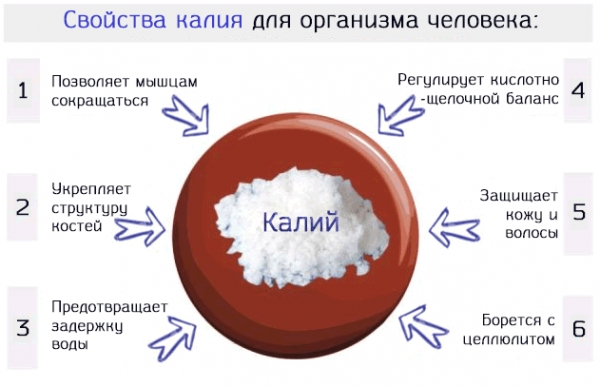
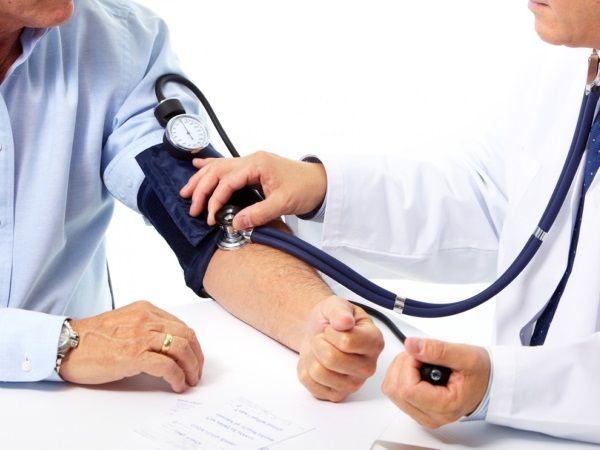
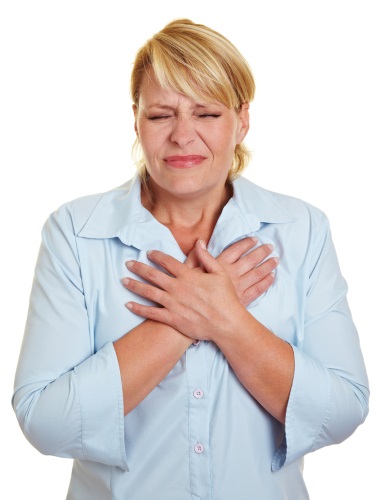
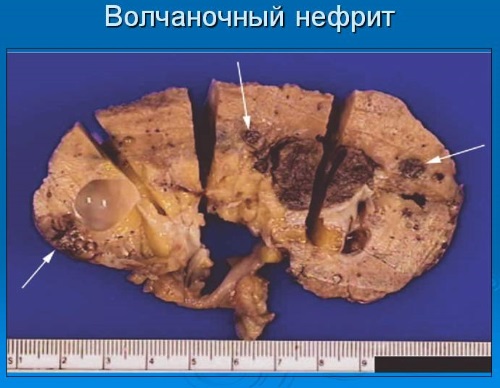
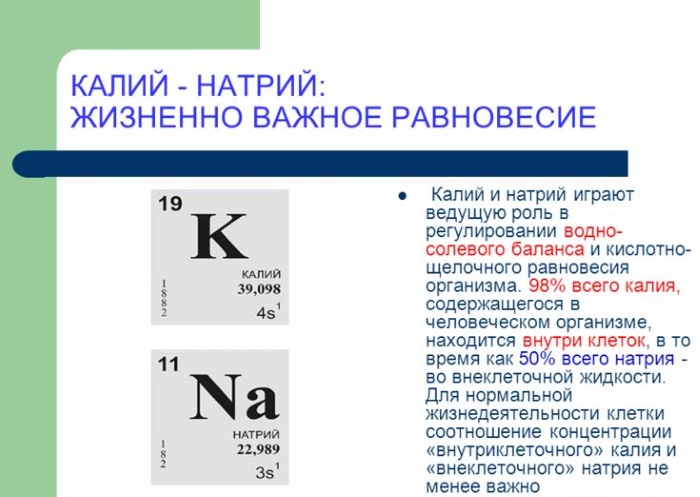
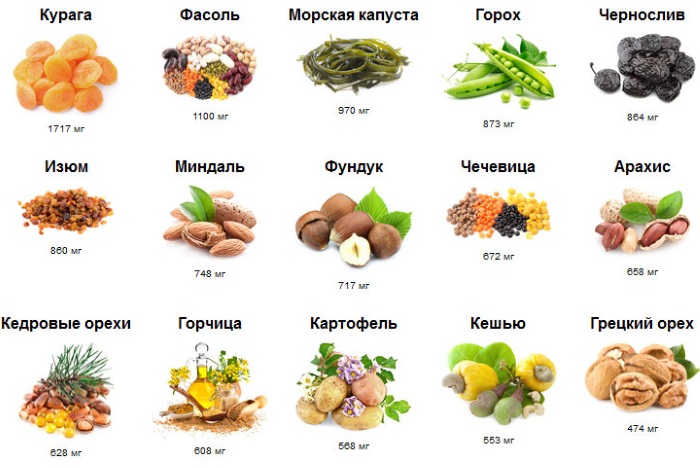
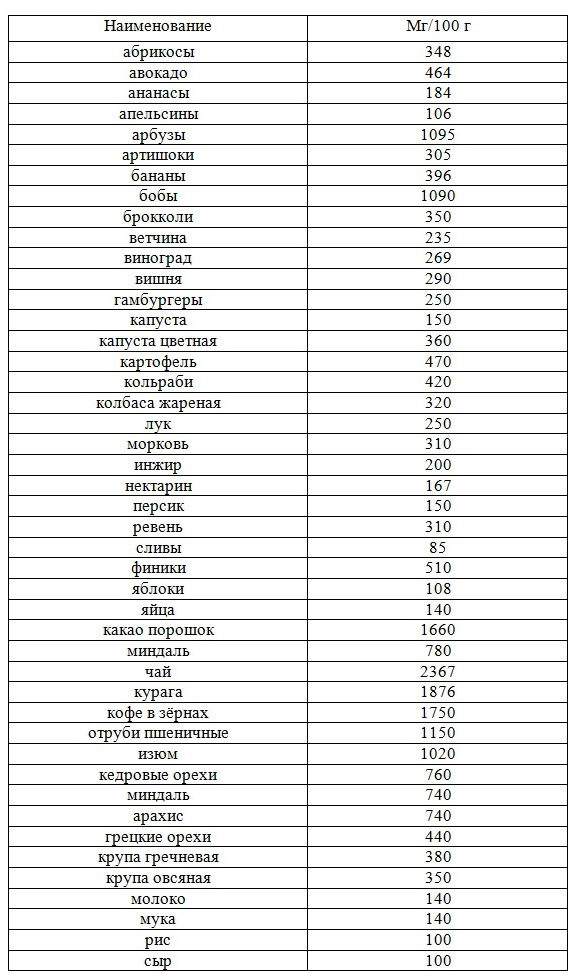
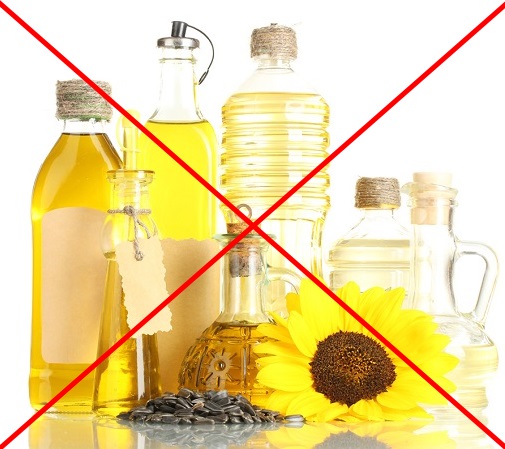
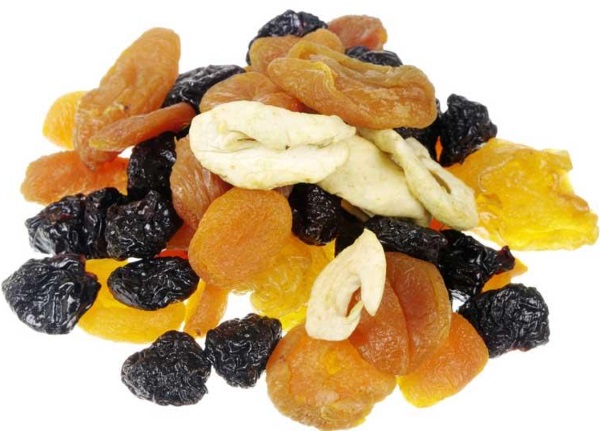
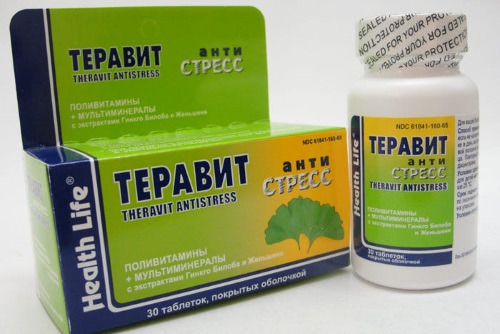
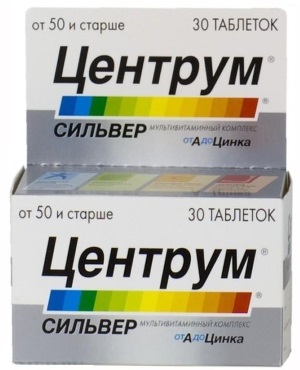
You also need to drink vitamins with potassium